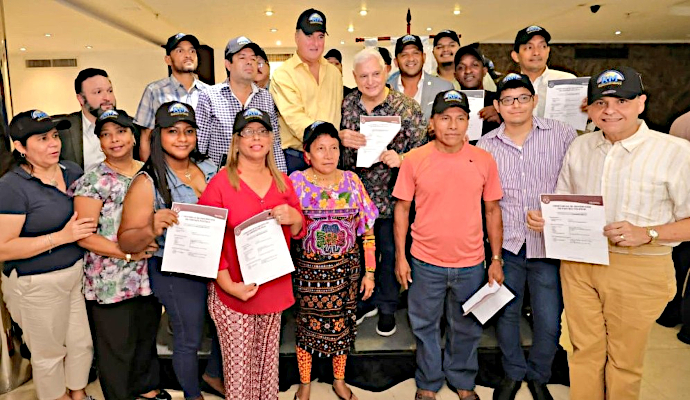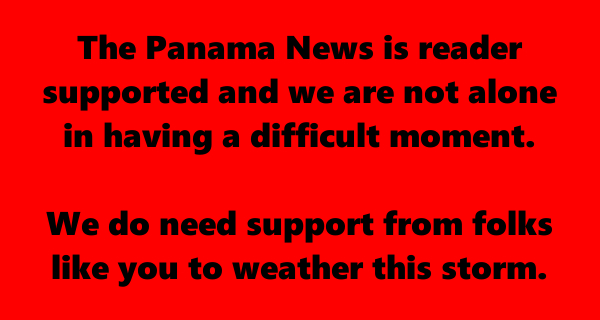Ricardo Martinelli with a group of activists who have quit MOLIRENA — the Nationalist Republican Liberal Movement — to join his Realizando Metas party. Most prominent in this photo, in the yellow shirt standing next to and partly behind Martinelli is businessman Jaime Ford Lara. The most noteworthy MOLIRENA recruit to the Martinelista cause so far is former legislator Francisco Ameglio. Photo from Martinelli’s Twitter feed.
Further fragmentation of the Panamanian liberal tradition
by Eric Jackson
You have a concept of what a liberal is based on a strain in US politics found largely in the Democratic Party? You’d be largely erroneous. The Canadian Liberal Party, the Japanese Liberal Democrats or the German Free Democrats? Those would be closer to the mark — parties of the center-right, not of the left side. But this is Panama.
These days the two most prominent elected officials of the Nationalist Republican Liberal Movement — MOLIRENA — are Panama City vice mayor Judy Meana, who for a while was Nito’s appointed governor of Panama province, and the right-wing religious fanatic legislator Corina Cano.
Consider the incongruity of the latter. Panama’s Liberal tradition was at its inception part of Colombia’s. All those 19th century civil wars pitted the Conservatives, based among large landowners and advocating Roman Catholicism as the official governmental religion, against the Liberals, based among commercial and industrial business owners and advocating secular government. “Pro-family” anti-abortion, gay bashing, speech and education restricted by the church politics? The issues were different back then but the clash between the founding philosophy and what gets proclaimed in Panama’s National Assembly remains.
However, also consider, after more than a century of repeated splits in the liberal tradition and the rise and fall of lesser political currents, what minor parties’ roles are these days. They are not about principled stands, not even about ideas. They are businesses, aimed at alliance with winning large party currents that are paid for in government jobs and public contracts. Nito Cortizo has said deprecating things about religious “pro-family” politics but his Democratic Revolutionary Party (PRD) needs the MOLIRENA votes to have a majority in the National Assembly, so that weird coalition is paid for largely by putting the national lottery and all those jobs in MOLIRENA hands. Not ideology, just business.
Panama’s separation from Colombia in 1903 followed a calamitous civil war, both here and in Colombia, the Thousand Days War. In that conflict the Conservative quickly gained control of the Panama Railroad tracks and the route along which the French were trying to build a canal, thanks in large part to foolish macho Liberal military leadership that ordered the troops to take the Calidonia Bridge over the Curundu River into the city center — as in charging into machine gun fire. Backed by the Panama Railroad and tacitly by the US and French governments, the Conservatives held onto Panama City, Colon and the route in between for the rest of the war’s duration. Independence from Colombia came in the wake of political breakdown in Bogota and a Conservative coup with US and railroad company instigation and participation. A few Liberals were persuaded to join the coup but Panama’s main Liberal leader, Belisario Porras, was declared a non-citizen and with a couple of rigged and/or stolen elections the Conservatives held onto power for less than a decade. In 1912 Porras became president and the Conservative Party never again came to power. But the Liberals were divided back then and it became worse.
In the 1920s, from the ranks of Liberals there arose the Accion Comunal movement, a racist formation led by two brothers, lawyer Harmodio Arias and physician Arnulfo Arias. At the start of 1931 Accion Comunal staged a coup that overthrew Liberal President Florencio Arosemena and briefly installed Harmodio as president. This was not to the liking of the American Embassy, which within two weeks arranged to have Ricardo J. Alfaro, also a Liberal, made president instead. Come the next elections Harmodio won, and after that his brother Arnulfo occupied the Presidencia. During his brother’s presidency Arnulfo penned an infamous public health bulletin about “racial health,” and was sent to Europe as a diplomat, where he became friends with Benito Mussolini, Adolf Hitler and Francisco Franco. Good Neighbor Policy or not, Franklin D. Roosevelt was not about to accept one of Hitler’s friends as president of Panama as Lend-Lease shipments to the allies were underway and US entry into World War II approached, so in October of 1941, through the American Embassy, a coup was arranged. Arnulfo Arias had a long postwar political career, but the Liberal moniker had been ditched and the tradition he founded lives on under the name of the Panameñista Party.
The Guardia Nacional, successor to the National Police who moved against the Arias brothers, tended to arrange or support various civilian factions which may or may not have used the Liberal name but had liberal roots and phraseology to back their acceptance of outright or more usually behind-the-scenes military power. The coup leader who ousted Arias, José A. Remón Cantera, ran things from offstage for a few years and ultimately ran for president himself, winning in a 1952 landslide at the head of a six-party coalition that included the Liberal Party and several other liberal splinters. Remón was assassinated in 1955, a largely unsolved crime which, according to much later released CIA documents, was believed to have been at the behest of American gangster Lucky Luciano, one of whose heroin shipments police had seized in Colon. Remón’s politics were about a social reforming militarism, aiming at a grand national coalition to vindicate Panamanian rights in the old Canal Zone. Remón made entry into the Guardias officer corps a meritocracy rather than an aristocratic privilege, giving rise to bright young officer like Omar Torrijos and Manuel Antonio Noriega. Arguably a mostly liberal foundation, the political movement got the designation Torrijismo after the strongman who emerged from a 1968 coup, and an institutional life as the Democratic Revolutionary Party.
From mostly outside of the liberal tradition there arose the Christian Democrats, today known as the Partido Popular, a centrist formation originally inspired by Cold War models and ideals; and Ricardo Martinelli’s formations — first Cambio Democratico and then Realizando Metas, basically around the notion that Ricardo Martinelli is this great guy destined to rule and a license to do anything he wants.
But now, in a bid to become president again that’s likely to be derailed by a disqualifying criminal conviction, Team Martinelli has absorbed a current of liberal extraction. For the moment, anyway.
Meanwhile on campus, “neoliberal” is a favored epithet for the wealthy oligarchy’s sticky-fingered political and business manipulations. It basically refers to a variety of “free trade” thinking that accepts and favors a globalized economy on terms set by multinational corporations. Which can pay well to politicians of various party colors if they can make the right deals.
Will there be anything left of MOLIRENA after this election cycle? If not, look for somebody or the other to pick up a version of the liberal name in a new party. It would befit Panama’s economic existence as a trade, warehousing, wholesaling and transportation center.
Contact us by email at fund4thepanamanews@gmail.com
To fend off hackers, organized trolls and other online vandalism, our website comments feature is switched off. Instead, come to our Facebook page to join in the discussion.
These links are interactive — click on the boxes











